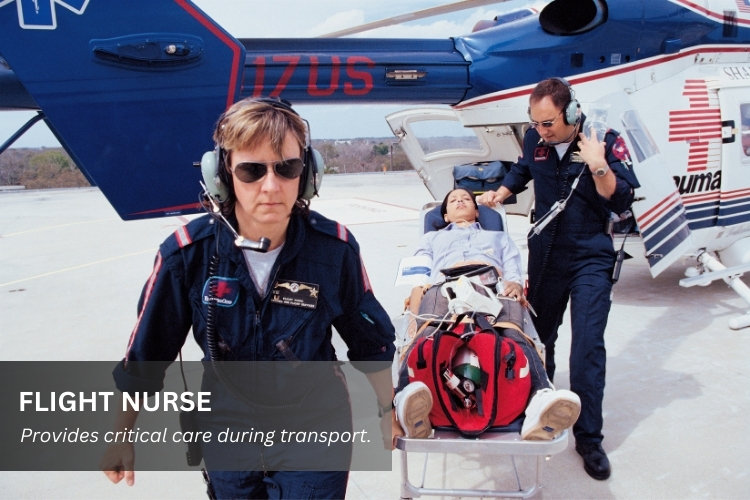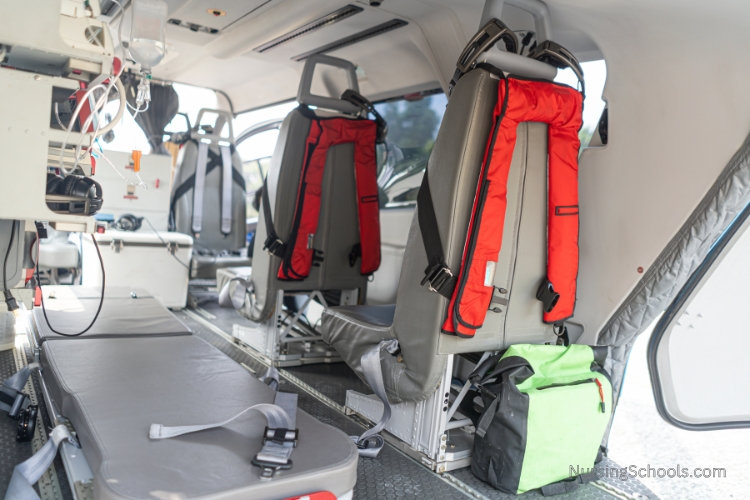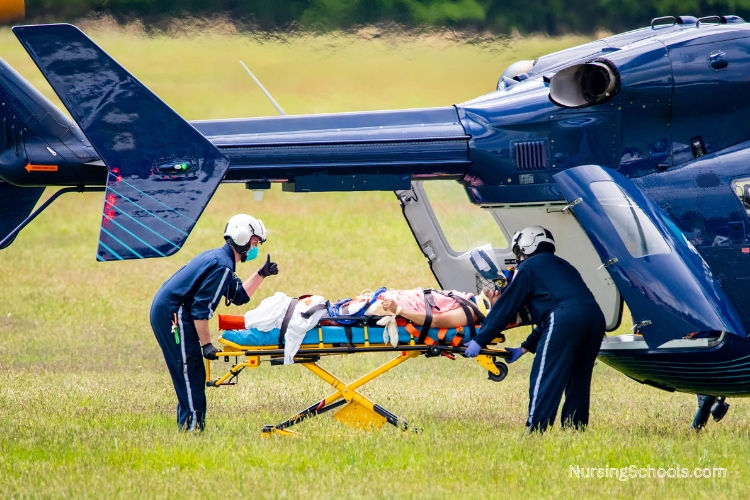Flight Nurse
Healthcare Career Guide

Overview
What is a Flight Nurse?
A Flight Nurse is a highly trained healthcare professional who provides critical care to patients during air transport. This role often involves working on helicopters or fixed-wing aircraft, delivering life-saving medical interventions in high-pressure environments. Flight Nurses collaborate with paramedics, pilots, and other medical professionals to stabilize and transport patients to hospitals or trauma centers.
The patients Flight Nurses care for are often in critical condition due to accidents, medical emergencies, or natural disasters. Their work requires a combination of advanced clinical skills, quick decision-making, and adaptability to unpredictable situations. They frequently perform tasks such as intubation, administering emergency medications, and managing ventilators, often while in transit.
Flight Nurses play a vital role in bridging the gap between emergency care and hospital treatment, ensuring that patients receive the best possible outcomes. This demanding yet rewarding career is ideal for those who thrive in fast-paced, high-stakes environments and are passionate about saving lives.
Education
How Do I Become a Flight Nurse?
Becoming a Flight Nurse requires advanced education, certifications, and clinical experience. Follow these steps to enter this challenging and rewarding healthcare career:
- Earn a Nursing Degree. Start with an Associate Degree in Nursing (ADN) or Bachelor of Science in Nursing (BSN). A BSN is often preferred by employers and provides a strong foundation for advanced certifications.
- Pass the NCLEX-RN. Obtain your nursing license by passing the National Council Licensure Examination for Registered Nurses (NCLEX-RN).
- Gain Critical Care Experience. Work as a Registered Nurse (RN) in emergency departments, intensive care units (ICU), or trauma centers to develop the necessary skills and knowledge.
- Obtain Advanced Certifications. Pursue certifications such as Certified Flight Registered Nurse (CFRN), Basic Life Support (BLS), Advanced Cardiac Life Support (ACLS), Pediatric Advanced Life Support (PALS), and Prehospital Trauma Life Support (PHTLS).
- Meet Physical Fitness Requirements. Ensure you meet the physical and medical standards required for air transport roles, including weight limits and fitness for high-altitude environments.
- Apply for Flight Nurse Positions. Once you’ve gained experience and certifications, apply for roles with air medical transport companies, hospitals, or government agencies.
The time it takes to become a Flight Nurse varies depending on your educational path and clinical experience. On average, it can take 5-8 years to complete the necessary education, gain experience, and obtain certifications.

Average Salary
How Much Does a Flight Nurse Make?
Flight Nurse salaries depend on factors such as location, experience, certifications, and employer type. On average, a Flight Nurse can expect to earn between $70,000 and $100,000 annually.
The average annual salary for a Flight Nurse:
- Entry-level: $70,000 - $80,000 per year.
- Mid-career: $80,000 - $90,000 per year.
- Experienced: $90,000 - $100,000 per year.
The latest salary report from the U.S. Department of Labor indicates that Flight Nurses earn an average hourly wage of approximately $38.00 per hour. Assuming a 40-hour workweek, this translates to an annual salary of $79,040. The lowest 10% of Flight Nurses earn less than $31.00 per hour, while the top 10% earn more than $45.00 per hour, making the annual salary range $64,480 to $93,600 per year.
Job Duties
What Does a Flight Nurse Do?
Flight Nurses perform critical care and emergency medical tasks in unique environments, often under extreme conditions. Their responsibilities extend beyond clinical care to include coordination and communication with ground teams and hospitals.
The most common job duties of a Flight Nurse:
- Providing In-Flight Medical Care. Administer medications, manage ventilators, and perform emergency procedures to stabilize patients during transport.
- Assessing Patient Conditions. Conduct rapid assessments to determine the severity of injuries or illnesses and prioritize interventions.
- Collaborating with Team Members. Work closely with paramedics, pilots, and other medical staff to ensure patient safety and care continuity.
- Maintaining Equipment. Ensure that medical equipment on board is functional, adequately stocked, and ready for emergencies.
- Documenting Patient Care. Record detailed notes on patient conditions, treatments provided, and any changes during transport.
- Training and Preparedness. Participate in regular training drills to stay prepared for emergencies such as crash landings or mass casualty events.
- Advanced Duties. Experienced Flight Nurses may also take on leadership roles, develop protocols, or mentor new team members.
Flight Nurses often work in challenging environments, such as helicopters or airplanes, where they must adapt to limited space and fluctuating conditions. Their job duties require a combination of technical expertise and emotional resilience.

Essential Skills
What Skills Does a Flight Nurse Need?
Flight Nurses require a blend of advanced clinical skills, quick thinking, and the ability to perform under pressure. Both soft and hard skills are essential for success in this role.
Here are some of the skills a Flight Nurse needs to succeed:
- Critical Thinking. Quickly assess patient conditions and make decisions in high-pressure situations.
- Communication. Effectively communicate with team members, patients, and hospital staff to ensure seamless care.
- Advanced Clinical Skills. Proficiency in emergency procedures, such as intubation, chest tube insertion, and trauma management.
- Teamwork. Collaborate with interdisciplinary teams to ensure the best outcomes for patients.
- Physical Stamina. Handle the physical demands of lifting patients, wearing heavy gear, and working in confined spaces.
- Adaptability. Remain calm and effective in unpredictable and rapidly changing environments.
- Technical Proficiency. Operate and troubleshoot medical equipment in-flight settings.
- Stress Management. Cope with the emotional challenges of handling critical injuries and high-stakes scenarios.
While the role of a Flight Nurse can be physically and emotionally demanding, it is also gratifying. Flight Nurses often save lives and make a lasting impact, knowing their efforts directly contribute to patient survival.
Last updated: February 1, 2025
References:
- Flight Nurse Salary in the United States. Salary.com. Retrieved February 1, 2025.
- Flight Nurse. Johnson & Johnson, Nursing Careers. Retrieved February 1, 2025.
- Registered Nurses. Bureau of Labor Statistics, U.S. Department of Labor. Occupational Outlook Handbook. Retrieved February 1, 2025.
- How to Become a Flight Nurse and Why Pursue the Career. Davis and Elkins College, Nursing Careers. Retrieved February 1, 2025.
- Flight Nurse. Wikipedia. Retrieved February 1, 2025.
- The Air & Surface Transport Nurses Association. Retrieved February 1, 2025.
- How To Become a Flight Nurse. Indeed for Employers. Retrieved February 1, 2025.


